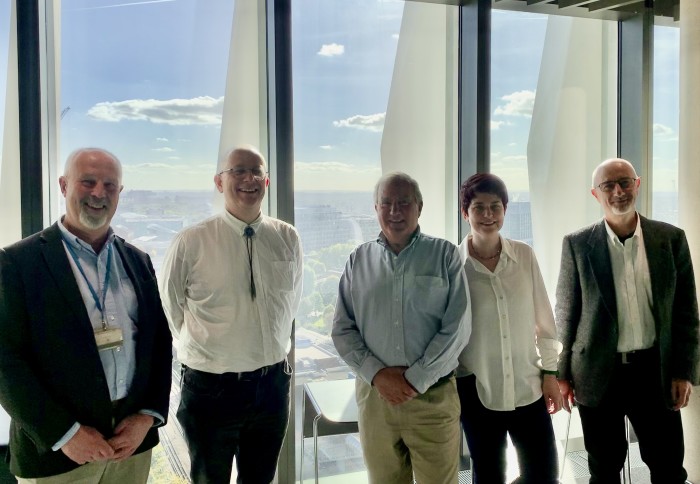Director of the Rosalind Franklin Institute visits Imperial's White City Campus

L-R: Prof Thursz, Prof Naismith, Prof Weber, Prof Ryan, Prof French
Professor James Naismith visited Imperial to give a talk on the RFI's research & technology, and future collaborative opportunities.
The Rosalind Franklin Institute (RFI) has the goal of transforming life science through interdisciplinary research and technology development, and Imperial is one of ten leading research universities that are ‘Franklin members’ and key collaborators on many of the RFI research projects.
"It’s the perfect opportunity for collaboration - where Imperial's clinical researchers know what the problems are, and the technologists, such as those at the RFI, know the potential solutions." Professor Jonathan Weber Dean of the Faculty of Medicine
Professor James Naismith, a world-leading expert in structural biology, blending structural analysis with mechanistic study and developing new approaches in biochemistry to answer chemical problems in biology, spoke on the subject of “Nanobodies and structural biology”.
Professor Naismith also discussed the latest imaging technology being used by researchers in RFI and how collaborations between the RFI’s technologists and Imperial’s clinical researchers hold exciting opportunities.
The event was opened by Professor Mark Thursz, Head of the Department of Metabolism, Digestion and Reproduction, who, alongside Professor Zoltan Takats, have worked on collaborative research with Professor Naismith and the RFI team.
Professor Jonathan Weber, Dean of the Faculty of Medicine, Professor Mary Ryan, Vice-Provost (Research and Enterprise), and Professor Paul French, Vice Dean (Research) - FoNS, joined an audience of colleagues from across the Faculties of Medicine, Engineering, and Natural Sciences.
 Speaking during the event, Professor Naismith said: “Imperial’s new White City Campus is very impressive, but I am particularly excited to see its proximity to Hammersmith Hospital. A fundamental part of successful translational research is access to clinical environments, expertise, and patients.”
Speaking during the event, Professor Naismith said: “Imperial’s new White City Campus is very impressive, but I am particularly excited to see its proximity to Hammersmith Hospital. A fundamental part of successful translational research is access to clinical environments, expertise, and patients.”
Commenting about the RFI’s work, Professor Weber said: “What is so exciting is that the RFI has extraordinary imaging capabilities in new areas, and this opens new spaces of exploration. When we think about the future of histopathology, looking at tissue sections under the microscope, and the sort of automated imaging capacity the RFI is building up, the real-world applications are incredibly exciting. For example, replacing electron microscopy for clinical samples in renal medicine could have a hugely beneficial impact on future research.
"I think what we really need is for the human pathologists to open up a dialog to identify what their needs are, and then determine what potential technological expertise the RFI can offer. It’s the perfect opportunity for collaboration - where Imperial's clinical researchers know what the problems are, and the technologists, such as those at the RFI, know the potential solutions. As such we need to continue to build our relationship with the RFI.”
Article text (excluding photos or graphics) © Imperial College London.
Photos and graphics subject to third party copyright used with permission or © Imperial College London.
Reporter
Benjie Coleman
Department of Surgery & Cancer